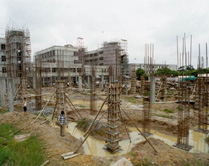
The Ministry of Land Resources recently released some statistics on its fight against irregularities in the land market.
Some 168,000 cases of irregularities have been disclosed nationwide this year, almost double the number of 2002. A total of 687 people involved in these cases were punished, including 94 who have been held accountable for criminal offences.
Despite the harsh campaign against irregularities in land deals, such cases still occur in several places, and many remain undetected.
In particular, the involvement of local governments in many illegal land cases has underlined one burning question: Why do local governments so frequently violate land regulations?
In the five serious cases the ministry made public as typical examples of irregularities, local governments had a role in four of them. They had all illegally granted the use of large areas of land to enterprises.
Under China's strict laws and regulations on land use and development, local governments under the provincial level have little authority to grant the use of land for construction purposes.
According to the cases disclosed, however, it is not uncommon for county and township governments to grant thousands of acres of land to enterprises and individuals, which goes far beyond their authority.
Aside from some local officials' blindness of law and corruption, the root cause of this rampant misuse of land resources is the long-standing practice which uses the gross domestic product (GDP) figures and financial revenue as the key gauge of local officials' performance.
In the wake of China's financial reform initiated in mid-1980s, tax revenues have been shared between central and local governments. Therefore, local governments got much leeway in developing local economy. The role of local governments is no longer administrators merely but also economic players, with clear goals to expand financial revenues.
Driven by the aspiration for higher economic growth, many local governments have chosen to sell farm land to procure the capital needed for urban construction. In this way, land is not only a natural resource, but also a kind of asset that can help local governments win their claim to credits.
This is the essence behind the wild irregularities in land development in many places.
But illegal land deals could not have been so rampant had severe punishment been meted out in every case. The price of irregularities is so low that some officials think it's worth the risk.
According to an official with the ministry, since 1998 few officials at county level or higher levels have been punished because of land deals.
So far, the investigation and handling of land cases mainly relies on administrative measures. For example, the land resources ministry has sent 10 supervisory teams to investigate situations in the use of land nationwide. Such practice, coupled with harsh rhetoric from the government as well as public opinion, can deter illegal activities for the time being.
But this is far from enough. Managing market affairs by administrative means has been proven barely efficient and vulnerable to corruption.
The fundamental way is to reform the land use system and adjust the old ideology of measuring local governments' work by GDP or tax revenues.
Moreover, it is imperative to highlight the role of law in land market. A transparent land assignment system should be introduced to a wider extent. And local governments that over-exploit land resources should be punished in a more serious manner.
The prerequisite to build a sound land market is to have effective laws and regulations to govern market activities and introduce judicial power to safeguard the implementation of these rules.
The law is the top weapon to regulate the order of the land market. If all violations, including the government's activities that violate the order, are held accountable, it will make wrongdoers pay much higher prices than they do now.
The author is a researcher with the China Research Society for Economic Restructuring.
(China Daily December 12, 2003)
|

